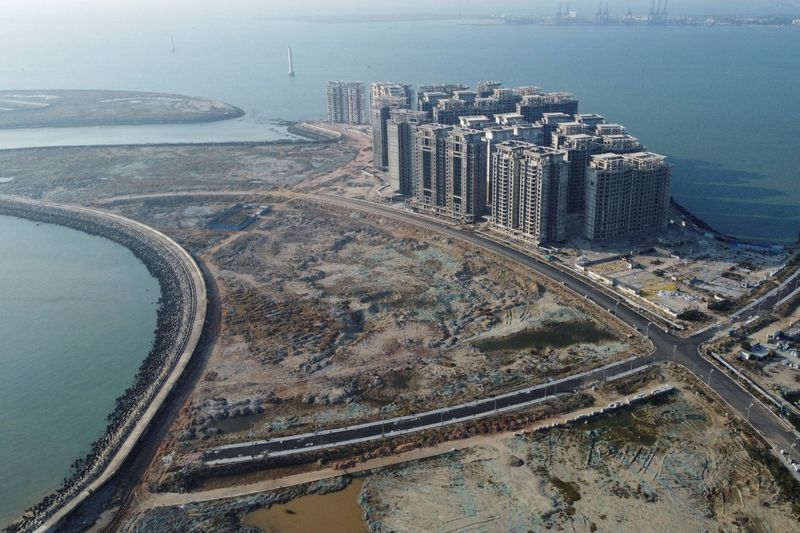

© Reuters. FILE PHOTO: An aerial view shows the 39 buildings developed by China Evergrande Group that authorities have issued demolition order on, on the manmade Ocean Flower Island in Danzhou, Hainan province, China January 6, 2022. Picture taken with a drone. REUT
NEW YORK (Reuters) – China’s real estate sector will likely see “significant easing” in the policies that govern it, BNP Paribas (OTC:) Asset Management said, months after starting to build a long position in that sector’s debt.
“We are of the view that we are at a major inflection point in terms of policy and we are likely to see some significant easing,” said Jean Charles Sambor, head of emerging market fixed income at BNP Paribas Asset Management (BNPPAM) in London.
“We are involved in the sector and we are positive in the sector. We have built this position over the last couple of months.”
Sambor could only discuss the overall sector, not company-specific investments.
Chinese real estate sector assets came under a lot of pressure last year after stricter financing rules for property development set in 2020 met with a mountain of debt, effectively engineering a contraction. The outsized importance of China’s real estate in the global economy sent shivers down many portfolio manager backs.
The CSI China Mainland Real Estate Index fell as much as 28% last year before closing down 15%, with stocks in China Evergrande, one of the biggest developers in the midst of a restructuring, down 89% in 2021.
Graphic: China real estate sector stocks – https://graphics.reuters.com/CHINA-PROPERTY/STOCKS/lgpdwjyzbvo/chart.png
Evergrande carries about $300 billion in liabilities including some $20 billion in international bonds. The foreign bonds, which traded above 90 cents in some cases last year, are now at default levels at under 20 cents on the dollar.
“The property market had been under pressure because (the government) wanted to deleverage and to some extent they achieved that,” Sambor said. “Now China wants to make sure that the rest of the sector is not at risk.”
Some international investors expect state-owned enterprises (SOEs) to help smooth debt restructurings, but others worry that it could open the door for Beijing to use the limited returns to pay its local debts first.
Sambor said a sector restructuring cannot be led by the state because private sector involvement in the property market is very large.
“SOEs are a significant part of the market but are not dominating it so it is difficult for them to engineer an SOE-lead restructuring. You need to have strong participation from the private sector,” he said.
Sambor said BNPPAM’s view on the real estate sector is part of a wider bet on fixed income returns within emerging markets.
“We think it’s going to be the year of the great normalization in Asia high yield, with a focus on China,” Sambor said. “Asian high yield, and China more specifically, will be a key driver of EM fixed income performance in 2022.”
Disclaimer: Fusion Media would like to remind you that the data contained in this website is not necessarily real-time nor accurate. All CFDs (stocks, indexes, futures) and Forex prices are not provided by exchanges but rather by market makers, and so prices may not be accurate and may differ from the actual market price, meaning prices are indicative and not appropriate for trading purposes. Therefore Fusion Media doesn`t bear any responsibility for any trading losses you might incur as a result of using this data.
Fusion Media or anyone involved with Fusion Media will not accept any liability for loss or damage as a result of reliance on the information including data, quotes, charts and buy/sell signals contained within this website. Please be fully informed regarding the risks and costs associated with trading the financial markets, it is one of the riskiest investment forms possible.


